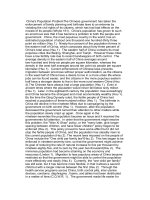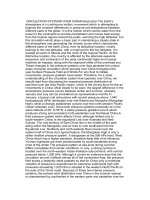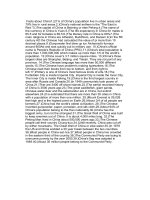china
Bạn đang xem bản rút gọn của tài liệu. Xem và tải ngay bản đầy đủ của tài liệu tại đây (21.8 KB, 1 trang )
CHINA For Chinese people what is the advantage of having many
children? They provide many hands to work and ensure that the land will
be worked when the parents are old. In the early seventies the
population of China was a little under a billion. That is why in 1972 the
Chinese government decided to implant the "wan xi shao" family planning
program. This program allowed families to have no more than two
children. By the late seventies apparently the Chinese population was still
growing. Thus in 1979 the government formed a new policy that allowed
families to have no more than one child. Because of this program it is
known that women who give birth to daughters are abused by their
husbands for not having a boy. One of the problems with such a
program is that it is difficult to enforce. This is why the government
provides positive economic incentives to families, such as, preferential
medical care and education. They are also given allocation of housing
and land, also larger pensions. For those families who disobey the result
is a reduction of 10 percent in monthly earnings and restrictions of food
supplies and education. The question the Chinese people have to ask
themselves now is what will happen in the years that follow? The
statistics show us that in the middle of the 21st century there will be a
disadvantageous distribution of the Chinese population according to age.
There will be a small group of workers that will have to support a large
group of retired people. The only way China can maintain a constant
population of 1.2 billion is if married couples average less than two
children for much of the 1990's.









